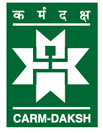About
-
Headquarters
Bilaspurr, Chhattisgarh
-
Since
1991
"Since its beginning, CARM-DAKSH (Centre for Action Research and Management in Developing Attitudes, Knowledge and Skills in Human Resources) evolved Read morefrom a capacity-building organisation to an implementing agency, primarily concentrating on the tribal belt of North Chhattisgarh. It was approached by the Thapar Group in 2009 to be a part of its CSR initiative in Raigarh district, and it has managed this collaboration effectively since then. It has established successful partnerships with donors like the National Foundation of India, WaterAid, SDTT, UK Aid's PACS program, NABARD, and TRIFED. CARM-DAKSH’s vision is to create a society that is casteless, equitable, culturally diverse, and community-driven, promoting gender equity and decentralisation of power and authority. Its mission is to support organisations, groups, or individuals in developing the knowledge, skills, attitudes, and values necessary to achieve this vision.
Cause Area
Programs
-
Natural Resource Management
CARM-DAKSH focuses on improving livelihoods in regions heavily reliant on agriculture. They've promoted Systematic Root Intensification (SRI) in paddy cultivation, which has significantly increased yields, benefiting around 3,400 farmers across 63 villages. They also promote the WADI program for tribal families, in one acre of land per farmer, to cultivate horticultural crops to increase their income. Furthermore, they work on climate-proofing watershed development projects in collaboration with NABARD to enhance climate resilience in rain-fed areas, including soil and water conservation and promotion of traditional farming practices.
-
Education
The Education Program, supported by WIPRO, was initiated in February 2020 in four villages of the Pali block in Korba district to enhance the quality of primary education through activity-based learning and provide support for slow learners. However, the COVID-19 pandemic led to the closure of schools, particularly affecting low-income private and government schools with limited access to online teaching methods. To address this, the state government introduced the "Padhai Tuhaar Duar" program, enabling students to study in their local areas through "Mohalla" classes in open spaces or community centers. In December, study centers were established with the collaboration of primary school teachers and Cluster Assistant Coordinators to ensure continued education in light of school closures.
-
Micro-enterprise Promotion
StateCARM-DAKSH recognises the need for rural families to diversify their income sources beyond agriculture due to shrinking farm sizes. To address this, they have introduced home-based microenterprises, including poultry farming with 30 units, which empowers rural women through cooperatives to serve local markets. These cooperatives offer training and financial assistance, supported by KWPCL, for rearing batches of 300 birds in backyards, ensuring a quick sales turnover. Additionally, CARM-DAKSH engages in various other activities like mushroom farming, papad production, detergent powder production, mobile repairing and driver training, sewing and tailoring, vermicompost production, and sanitary napkin unit production, promoting diverse income opportunities for the rural population.
-
Water, Sanitation and Hygiene
With support from WaterAid, the organisation has implemented various models and initiatives to tackle water, sanitation, and hygiene (WASH) related challenges, including Menstrual Hygiene Management (MHM) programs for women and adolescent girls. They have introduced ECO SAN toilets, demonstrating cost-effective models and reducing costs by involving the community and using local materials. CARM-DAKSH has also established community-based water supply schemes and protected contaminated hand pumps by installing hand pumps on dug wells to ensure access to safe water. They also work on improving school sanitation and hygiene to enhance the attendance of school-going children, particularly girls, by renovating school sanitary blocks and providing water supply and incinerators. To further strengthen WASH efforts, they have established a community water sanitation resource centre to train local youths in essential skills related to water quality testing and water infrastructure maintenance.
-
Urban WASH
StateThe program's primary goal is to enhance community-centric governance in select urban poor communities in the state of Chhattisgarh, with a focus on improving awareness, sensitizing community representatives, and ensuring accountability of local administration. The program, supported by the National Foundation of India, is being implemented in the towns of Mungeli and Ratanpur. Key initiatives include raising awareness about the health impact of water, sanitation, and waste interventions, establishing Mohalla Samiti (neighborhood committees), improving access to safe water, better sanitation, and waste services, promoting cost-effective technologies and solutions for these interventions, and showcasing models to enhance access to these essential facilities.
-
Institution Building
This program's focus is women's empowerment, through formation of Self Help Groups (SHGs) and their credit linkage from banks and other financial institutions. The SHGs are organised into a federation, allowing them to collectively address critical issues, such as midday meals, alcoholism, Public Distribution System (PDS) and participation in Panchayat elections. They have successfully completed an SHPI program for 50 SHGs in Bilaspur District with NABARD's support and have further received sanction for 300 SHGs in the same region. Additionally, active farmers were mobilised to form Kishan Clubs, with 65 established, primarily focused on promoting Systematic Root Intensification (SRI) in the villages.
Leadership Team
M&E
-
Internal, External Assessors
No
Policies
-
Ethics and Transparency Policies
No
-
Formal CEO Oversight & Compensation Policy
No
Political & Religious Declarations
-
On Affiliation if any
No
-
On Deployment Bias if any
No
Registration Details
-
FCRA
Not Available
-
CSR Registration Number
Not Available
Location
-
Headquarters
House No 19, Gitanjali Park, near Maharishi School, P.O. - Magla, Nehru Nagar, Bilaspurr, 495001
Directions
Other Details
-
Type & Sub Type
Non-profit
Website
Financial Details
-
2020-21
IncomeRs.29,537,777ExpensesRs.17,215,985Admin ExpensesRs.1,924,619Program ExpensesRs.15,291,366Tip: Click on any value above to exclude it. -
2021-22
IncomeRs.11,548,524ExpensesRs.20,522,657Admin ExpensesRs.2,250,480Program ExpensesRs.18,272,177Tip: Click on any value above to exclude it.

